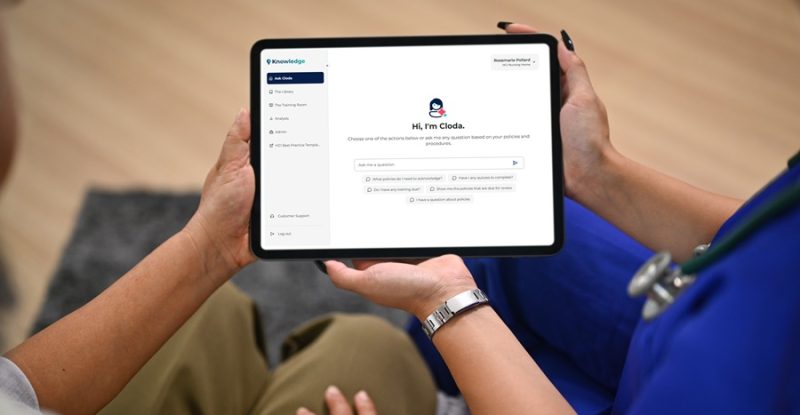
Introduction
Managers in disability services face increasing demands to demonstrate HIQA compliance, foster policy engagement among staff, and embrace digital transformation. Regulatory requirements are more complex, expectations around quality and safety are rising, and the workforce is more mobile and diverse than ever before. Navigating these challenges while maintaining person-centred care requires not just commitment, but also the right tools and strategies.
This blog explores actionable tips for managers in disability services to strengthen compliance, boost policy engagement, and drive digital transformation, while illustrating how digital solutions like Knowledge and its digital assistant, Cloda, can make these goals achievable and sustainable.
Before we dive in, we would love to hear your thoughts below!
Poll: What’s the biggest obstacle to ensuring staff comply with policies and procedures in your organisation?
Cast your vote and see what your peers say!
Understanding the Compliance Landscape in Disability Services
Disability services operate in a highly regulated environment. Whether your organisation supports individuals in residential, day, or community settings, you must demonstrate adherence to national standards, safeguarding frameworks, and sector-specific legislation.
Regulation 4 of the Health Act requires providers to prepare, adopt, and implement written policies and procedures on the matters set out in Schedule 5. These must be made available to staff and reviewed at intervals not exceeding three years, or more frequently if required by the Chief Inspector, and updated in line with best practice.
Compliance is not a one-off event; it’s an ongoing process that requires vigilance and adaptability. Key compliance challenges include:
- Keeping policies and procedures up to date with regulatory changes
- Ensuring all staff understand and apply current procedures
- Ensuring staff have easy access to procedures
- Maintaining auditable records of staff competencies and policy acknowledgements
- Responding quickly to inspections and audits
Tip: Centralise and Digitise Policy Management
Relying on paper-based or fragmented digital documents makes compliance harder. Implementing a digital policy management system like The Knowledge Library ensures all policies are stored in one secure, user-friendly, accessible platform. Updates can be rolled out instantly, and staff can access the most current versions from any device, crucial for mobile teams.
Driving Policy Engagement: Moving Beyond “Tick-Box” Compliance
True compliance isn’t just about having policies in place, it’s about ensuring your team truly understands and applies them in their daily work. Engagement is the bridge between compliance “on paper” and compliance “in practice.”
Common barriers to policy engagement:
- Information overload: Staff may be overwhelmed by lengthy or complex documents.
- Lack of time: Busy schedules leave little room for reading or training.
- Limited accessibility: Policies that are hard to find or navigate are less likely to be used.
- Language barriers: Policies are typically written in English, but with over 50% of health and social care staff in Ireland being internationally trained (OECD, 2024), English may not be their first language which could impact comprehension of procedures.
Tip: Make Policies Accessible and Relevant
Use a digital platform like The Knowledge Library to provide mobile-enhanced access to policies and procedures. Staff can quickly locate what they need, whether they’re in the office or supporting someone in the community. Intuitive search features make engagement easier and more meaningful.
Leverage Digital Assistants for Real-Time Support
Even when staff can access policies, understanding and applying them in real time can be difficult, especially in high-pressure situations or for those with varying language proficiencies. Support managers need a tool that makes knowledge instantly available.
Tip: Use Cloda to Support Real-Time Decision-Making
Cloda, Knowledge’s built-in digital assistant, answers staff questions about policies instantly, and in staffs’ own language. Instead of sifting through documents, team members simply ask Cloda and receive clear, concise answers, based only on your organisation’s approved procedures. Cloda also supports multilingual communication, staff can ask questions in their native language and receive answers in their language, reducing risk and ensuring consistent, accurate application of policies.
Embedding a Culture of Continuous Learning
Support managers play a critical role in shaping organisational culture. Fostering an environment where learning is continuous, and where staff feel accountable for quality and compliance, helps move from reactive responses to proactive excellence.
Strategies to foster this culture include:
- Regular, bite-sized training: Move away from annual, one-off sessions. Use micro-learning and comprehension quizzes to reinforce key points regularly.
- Monitor and track engagement: Use digital tools to track policy acknowledgements and quiz results. This provides a clear record for audits and highlights areas where further support may be needed.
- Encourage two-way communication: Create channels for staff to ask questions and suggest improvements to policies and procedures.
Tip: Automate Tracking and Reporting
With Knowledge, support managers can easily track which staff have acknowledged each policy and monitor engagement by department or location. This not only supports compliance audits but also helps identify gaps in understanding.
Tip: Utilise Comprehension Quizzes
Cloda can deliver comprehension quizzes linked to specific policies. This feature not only reinforces learning but also gives managers insight into staff understanding, turning compliance into a dynamic, measurable process.
Embracing Digital Transformation: Why It Matters for Disability Services
Digital transformation is more than adopting technology, it’s about using digital tools to deliver better outcomes for service users, streamline operations, and support your team in real time.
Benefits of digital transformation in disability services:
- More accessible procedures for staff across multiple locations
- Reduced administrative burden, freeing time for care
- Real-time access to guidance, improving responsiveness and safety
- Data-informed decision-making and improved oversight
- Enhanced staff experience, which supports retention and morale
Tip: Start with Quick Wins
Begin your digital journey by digitising the most critical and high-impact processes, such as policy management and compliance tracking. Solutions like The Knowledge Library and Cloda are designed specifically for disability service providers, making implementation straightforward and results tangible.
Choose Scalable, Sector-Specific Solutions
Not all digital platforms are created equal. Disability services have unique requirements that general document management tools can’t always address, particularly around staff access and understanding of procedures, the high-pressure, sometimes unpredictable work environments, governance and audit readiness.
Tip: Choose Scalable, Sector-Specific Solutions
Cloda, the digital assistant within Knowledge, gives staff instant support. Whether they are responding to a safeguarding concern, de-escalating a behaviour that challenges, or assessing risk in a new environment, Cloda delivers clear, accurate guidance based on your organisation’s approved procedures. This real-time, easy access to procedures helps reduce uncertainty, improve decision-making, and ensures staff act consistently.
Highlighting the Value of a Connected Workforce
In modern disability services, staff often work across multiple sites or remotely. Supporting a connected workforce, one that is aligned on procedures and values, is key to consistent, high-quality care.
Tip: Bridge Gaps Across Teams with Digital Consistency
With Knowledge, every staff member has access to the same approved policy at the same time, no matter where they are. When combined with Cloda’s ability to provide instant, contextual answers, you ensure consistent understanding and action across your team. This supports compliance, improves continuity of care, and empowers staff to work confidently in dynamic settings.
Demonstrating Compliance During Audits and Inspections
Audits and inspections are a routine part of disability service provision, and being well-prepared demonstrates a proactive commitment to quality and governance. Regulation 4 places clear obligations on providers to ensure policies and procedures are documented, made available to staff, and reviewed regularly. HIQA inspectors will often assess not only the presence of required policies (as per Schedule 5), but also whether staff can access and understand them in daily practice.
Tip: Let Your System Do the Heavy Lifting
The Knowledge Library supports audit readiness by recording policy review dates, tracking document acknowledgements, and logging comprehension quiz completions. This gives support managers the ability to provide clear, timely evidence that staff are engaging with procedures and that leadership is actively maintaining oversight. These digital insights demonstrate compliance with Regulation 4 and showcase your service as a well-governed, learning-focused organisation.
Practical Steps for Support Managers
While the path to compliance and digital transformation can seem complex, it becomes manageable with clear, strategic actions. By focusing on what matters most, your disability service can lead meaningful, sustainable improvements in practice and culture.
1.0 Assess Your Current State
- Audit your existing policies and compliance processes
- Identify gaps in accessibility, engagement, and tracking
2.0 Set Clear Goals
- Define what success looks like for compliance and engagement in your service
- Involve frontline staff in setting priorities
3.0 Implement the Right Tools
- Adopt a digital policy management system like Knowledge
- Enable Cloda to support staff with real-time answers and learning
4.0 Monitor, Review, and Improve
- Use analytics and reports to monitor engagement and understanding
- Regularly review policies to ensure they remain relevant and effective
- Celebrate successes and share learnings across your team
Conclusion: Leading the Way in Compliance and Digital Transformation
Support managers in disability services are at the forefront of delivering safe, high-quality care in a complex environment. By embracing digital tools like Knowledge and Cloda, you can make compliance simpler, boost policy engagement, and drive meaningful digital transformation.
The goal is not just to “tick the box,” but to embed best practice into everyday care—empowering your team with the clarity and confidence to know what to do in any situation. Whether it’s safeguarding, managing challenging behaviour, or responding to an inspection, your team has the support they need, when and where they need it.
Book a demo today and see the future of compliance in action. Contact info@knowledge.care or call 01 629 2559.

Book a Demo (1)
"*" indicates required fields



